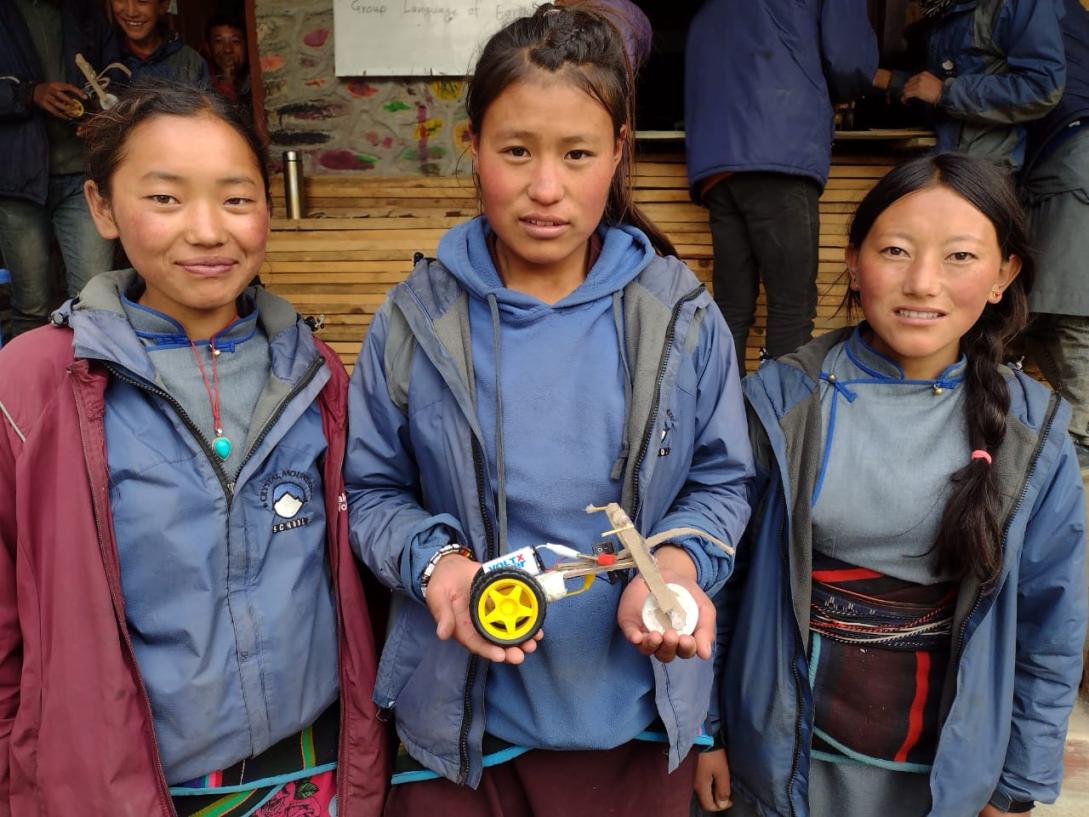STEAM Ahead: Showing Talent, Equality & Ambitions of Marginalized Children in Karnali

|
“Education is vital, and it is the beacon of light that shines even in the darkness. Without education, life is bleak,” said Bandana, a student at Tripura Secondary School in Dolpa, Karnali Province. She dreams of becoming an engineer after finishing her secondary school studies. As someone who has experienced many challenges to access quality education, Bandana recognizes its importance. Remoteness of schools, poor infrastructure, and time spent on household chores, disrupted learning, these are some of the challenges faced by Bandana, her classmates and children across Dolpa. The district of Dolpa can only be accessed by foot or plane, depending on the weather. Poor infrastructure has also impacted access to schools, especially for the majority of teachers who live outside of Dolpa, because of a lack of human resources, as well as students who have to walk long hours to get to school. During winter, these long walks become even more difficult, which is why schools in Dolpa close for 3 month. The schools are again closed for about 2 months for Yarsa Gumba (caterpillar fungus) harvesting season. These long breaks hinder student’s learning retention, putting them at a disadvantage. In addition to the limited infrastructure, many schools also do not have the resources, such as educational and sports materials, to give the students quality education. For girls like Bandana, there are even more, complex sociocultural factors that limit their access to education. 30% of girls in Dolpa’s schools reported that harassment by boys as the number one reason they felt unsafe at school, followed by unsafe toilets (26%), punishment by teachers (16%), fights among students (14%), and others. The high prevalence of child marriage is another barrier to education. Up to 49.5% of children are forced into marriage before completing their education. The dropout rate is even worse for children with disabilities. The Steam Ahead: Showing Talent, Equality and Ambition of Marginalized Children in Karnali project works to strengthen educational systems across Karnali by improving students’ learning environments so that students like Bandana can achieve their lifelong dreams. The project focuses on creating tech-friendly and inclusive educational systems to make learning engaging for all students. Led by Plan International, the implementing partners include Open Learning Exchange to develop inclusive content on Nepali Sign Language and local languages, and Women in STEM to build gender-responsive education plans and curricula on science, tech, engineering and mathematics. STEAM Ahead also works directly with district government officials, local organisations and the school’s administrative staff to establish inclusive, child-centred and gender transformative education plans and policies. The project targets both policy and on-the-ground level interventions. It has collaborated with government authorities, and school management committees to develop education plans and policies that address the issues raised by the feedback and complaint mechanism that they have introduced to schools. To address one of the biggest barriers for girls to attend school, the project has supported menstrual hygiene management and improved access to sanitation and health services in schools. Additionally, in order to promote child friendly pedagogy, it has also retrofitted schools with insulation and carpets so that children can sit and lay during colder months. On the digitization side, the project has worked on developing tech curricula and trained teachers on the use of STEAM learning materials such as e-libraries and makerspaces – a space for collaboration between the arts and the sciences. With stronger education systems that prioritize gender-responsive and inclusive learning, the students of Dolpa and Karnali Province are gaining access to quality education that will equip them with the practical skills and knowledge for the future. By working with students, teachers, mayors and parents alike, STEAM Ahead will make an informed, responsive and accountable education system, particularly for women, girls and children with disabilities, so that every child’s dream becomes a reality.
|





